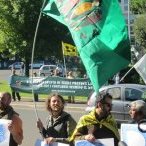
17 October 2011 | Chronicles | Negotiations on the Guidelines on Responsible Governance | Human rights
We Left our Footprint
Social movements evaluated agreements reached around Guidelines
Download: MP3 (5 Mb)
On October 15, in the eve of the World Food Sovereignty Day, the talks around the Guidelines on land tenure and the use of other natural resources came to an end.
It was an intense week for the representatives of social organizations and non governmental organizations, during which nearly 70% of the document content was agreed upon.
One of the delegates of the social movements said “there is clear evidence we were here”, since the governments felt pressured to accept demands like considering access to common goods as a right that needs to be protected by the national states and the multilateral agencies.
Beyond the tiring, long working days, at the final evaluation there were two major achievements in a process that is not the beginning or the end for the struggles of peasants, women, fishworkers and nomadic pastoralists, the latter were officially recognized by the text approved.
FAO and the streets
Angel Strapazzon of the National Indigenous Peasant Movement of Argentina (Via Campesina) said “We have managed to get an important part of our political views included in the document. We are aware this is no easy thing as we were negotiating with governments that defend the interests of corporations that are concentrating and commodifying the peasants’ natural resources in our countries. This is a tool. Our struggles boil down to what happened today in the streets”, he said referring to the massive demonstration against the financial system held last Saturday in Rome , which resulted in harsh repression.
“I have seen there is true and legitimate respect towards the civil society. I would like to thank everyone for this work and I hope that in the future we will manage to make progress for the peoples in conflicting situations” said Razan Zuayter, of Palestine.
There are some aspects still to discuss, like the chapter on Investments on Agriculture and Peoples in Conflict.
The lack of key governments like India at the negotiations was also considered as a political situation to take into account, as well as the fact that for the first time several African governments were forced to negotiate, and therefore recognize, their countries’ social movements.
Javier Sanchez, of the Coordination of Via Campesina Europe, said that “typically when we talk about land grabbing they think it is a problem from the ’south’, so many governments did not expect having someone from Europe among the civil society representatives”. Javier said that the NGO were fundamental in this process, without them “it would be impossible to do our work”.
The work done by Sofia Monsalve, from FIAN International, was especially acknowledged. She was fundamental in advising and representing movements in a tough space like the FAO talks.
Monsalve said that the work “we began in 1996 when no one was talking about the agrarian reform” is slowly being included in the Guidelines. FIAN believes this the result of the work of 20 years, so we are thankful for the trust. This is not about technical expertise, but about sharing world views. In this interaction with peasants, indigenous peoples, nomadic pastoralists and fisherfolk, our cosmovision has changed”, said Monsalve during the evaluation round.
What remains to be discussed
The commitment reached between governments and the civil society implies closing the issues agreed on, submitting them to the Committee on Food Security and have an extraordinary meeting to consider the remaining 30% of the text left for discussion.
Renaldo Chingore Joao, from Mozambique, said “What we have achieved is not enough. It is important, but we know that at a national level there is a lot of work to be done, especially to get the national governments to enforce the Guidelines. Transnational corporations are still taking over land. I call on you to work with your governments so that they adopt the Guidelines”.
The negotiating capacity of the civil society was another highlight. Even though the rules were changed throughout the process, since there were “agreed and clear baseline texts”. Some representatives wanted “civil society representatives to advise them, so we should be aware of the danger of being co-opted”.
During the weekend 50 social movement and NGO representatives have met in the so called Civil Society Mechanism to prepare their participation in the session of the World Committee on Food Security.
Photo: FIAN







